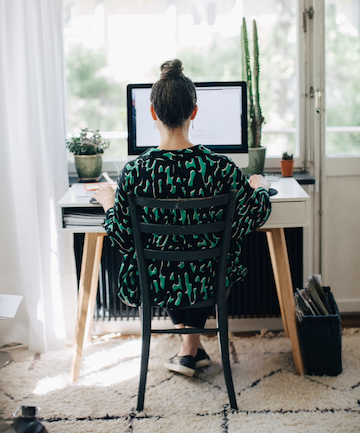Turns out, the better we become at not doing (or at least at doing less at once), the better we will get at doing. This does not mean disregard all commitments in favor of comfort, but rather that, at times of freedom, we need to be just as invested and present with activities whose only purpose is to either rest or recharge us in ways that work for us. Working from home has become the reality of many, significantly more post-Covid. This is a huge change in lifelong, similar routine for a lot of people, and adjusting to new circumstances of that magnitude, and the impact on our lives going forward, quite understandably brings on burnout, depression and anxiety — the most common signs of poor mental health.
Using data from stress.org, the American Psychological Association, Emolument, the Department of Labor and the Association of Psychological Science, experts at Joy Organics have compiled a list of 5 tips so simple, incorporating them, even for a one-day-only trial run in your week, might actually require less energy than it does to grow in anxiety, yet another day. They've also provided us with the why and the how for each step, so let's take the first one together — today.
Image via Maskot/Getty
Using data from stress.org, the American Psychological Association, Emolument, the Department of Labor and the Association of Psychological Science, experts at Joy Organics have compiled a list of 5 tips so simple, incorporating them, even for a one-day-only trial run in your week, might actually require less energy than it does to grow in anxiety, yet another day. They've also provided us with the why and the how for each step, so let's take the first one together — today.
Image via Maskot/Getty
"According to a study by stress.org, more than 50% of workers are not as productive at work due to stress, and 39% claim workload is the main cause." —Joy Organics.
It's important to be away from your work every few hours, otherwise your brain will freeze up and feelings of burnout or anxiety will start to become stronger. Only eleven out of fifty states mandate some type of rest break for workers. If your employer allows a break, you should make sure it is uninterrupted. When an office is also a kitchen, or a bedroom, even a small walk in your garden or just around the neighborhood will help.
Image via urbazon/Getty
It's important to be away from your work every few hours, otherwise your brain will freeze up and feelings of burnout or anxiety will start to become stronger. Only eleven out of fifty states mandate some type of rest break for workers. If your employer allows a break, you should make sure it is uninterrupted. When an office is also a kitchen, or a bedroom, even a small walk in your garden or just around the neighborhood will help.
Image via urbazon/Getty
Hustle culture has become common in workplaces over the previous years. This can be a huge contributor to stress and depression as the work keeps coming in. You have a finite number of hours at work, so don't take on a week's worth hoping to get it done in a day. Set boundaries and know when to focus on the work you already have.
A healthy separation of work and private life is one of the most important things for remote workers. Think about putting everything work-related onto a different browser or screen to simulate "going to the office."
"Workplace stress can affect anyone, but research has shown that women must contend with their hormones on top of everyday stresses. In fact, 57% of women reported feeling burnout because of work stress, compared to 48% of men." —Joy Organics.
Image via Maskot/Getty
A healthy separation of work and private life is one of the most important things for remote workers. Think about putting everything work-related onto a different browser or screen to simulate "going to the office."
"Workplace stress can affect anyone, but research has shown that women must contend with their hormones on top of everyday stresses. In fact, 57% of women reported feeling burnout because of work stress, compared to 48% of men." —Joy Organics.
Image via Maskot/Getty
Having another perspective is useful for lowering your stress levels. Talking to your team or a manager alleviates the feeling of being lonely and means that you can solve problems faster. Feelings of isolation are much more common in remote work; however, there are ways you can alleviate those feelings.
Instead of struggling with a project alone, ask for a quick meet or an informal chat to have another set of eyes on it. Reach out to other team members and organize a brainstorming session. Be aware that communication does go both ways, and you should be available to help others just as they help you.
Image via LumiNola/Getty
Instead of struggling with a project alone, ask for a quick meet or an informal chat to have another set of eyes on it. Reach out to other team members and organize a brainstorming session. Be aware that communication does go both ways, and you should be available to help others just as they help you.
Image via LumiNola/Getty
Looking at your work as a huge single object is daunting. Those feelings of dread can feed into depression and anxiety, so splitting up workload into manageable chunks will make things easier. Try Stephen Covey's four quadrants of time management approach:
Urgent and important — unforeseen events and urgent matters
Not urgent but important — smaller tasks that won't affect your deadlines
Urgent but not important — meetings and phone calls
Not urgent and not important — checking socials
Image via filadendron/Getty
Urgent and important — unforeseen events and urgent matters
Not urgent but important — smaller tasks that won't affect your deadlines
Urgent but not important — meetings and phone calls
Not urgent and not important — checking socials
Image via filadendron/Getty









